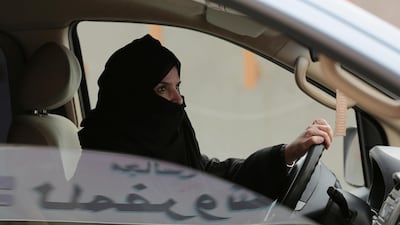On Tuesday, King Salman of Saudi Arabia issued a royal decree that would pave the way for Saudi women to drive. It was a profoundly emotional moment for Saudis, who saw the historic move as much more than lifting a ban on women driving. The decree is widely regarded a statement and a signal of major social change.
The royal decree removed a restriction that previously prevented the interior ministry from issuing driving licences to women. The contentious ban on women driving was enforced in large part in an attempt to appease social conservatism. In their opposition of the idea of women driving, opponents often cited various reasons, including fears that driving would expose women to public harassment, abuse and decadence.
Societal resistance to the ban was so strong that proponents of it came up with bizarre justifications. Sheikh Saleh Al Lihaydan, a Saudi cleric, even went as far as to claim that scientific findings show that women who spent time in the driving seat, as opposed to the backseat, had their ovaries crushed as their pelvis got pushed upward. They dismissed arguments that gender segregation, which they champion, is violated by the need for women to have male private drivers.
Since early 2016, rumours of a prospective move to lift the ban increasingly surfaced in the region and in western policy circles. In February last year, Adel Al Jubeir, the Saudi foreign minister, explained that the issue was complicated by society, not religion. "When it comes to some issues like women driving, this is not a religious issue, this is a societal issue." While it was not strictly a religious issue, though, conservative clerics were part of the voices that resisted any move to lift the ban.
With the announcement of Vision 2030, under the auspices of Crown Prince Mohammed bin Salman, lifting the ban became clearly a matter of time. Gulf officials, cited by The National in June, said the momentum for reform in the kingdom would soon compel authorities to move ahead with the decision to remove the restrictions on women driving.
Such a move was frequently put on the table, often through rumours that Saudi Arabia would end the ban in the coming months. The issue gained extra attention as Gulf officials close to Saudi Arabia indicated that authorities intended to make the move within the next six months.
_______________
More from Opinion on Saudi Arabia
Vision 2030 comes to the Red Sea
Mohammed bin Salman: a young leader with many ideas
Change in Saudi Arabia is coming...with buy in from across society
_______________
It eventually happened on Tuesday. For outsiders, the decision may sound less impressive than the domestic euphoria suggested. And it may be so in isolation. But authorities took a number of measures in the days and weeks leading up to the decision in a way that suggests the move was part of a bigger and more interesting message.
Three days before the royal decree was issued, for example, authorities allowed women to participate in the National Day celebrations. Aside from women participation per se, the celebrations included a concert in King Fahd International Stadium in Riyadh. Footage of gender-mixing in such an environment of music and dancing circulated on social media amid raised eyebrows from extremist and conservative elements in Saudi Arabia and the region.
A week before the decree, authorities swiftly suspended a cleric over disparaging remarks against women. In a speech, Saad Al Hijri spoke out against women driving and claimed that a woman’s brain would shrink to a “quarter” the size of a man’s brain when she goes shopping.
_______________
More from Hassan Hassan
Terrorists hijacked a single verse to justify their crimes. It's time to match their vigour
The story of Hayat Tahrir Al Sham's rise to prominence and what it means for Syria
New Saudi policy will ensure clerics fall in line
_______________
These measures also followed the arrest of nearly 30 clerics and individuals. The arrests two weeks ago appeared to have included mostly a specific type of cleric with a history of political activism, and who young Saudis view as advocates of Islamism, sectarianism and hate speech. The move was an attempt to send a message to activist clerics and their base that a new approach, which involves less tolerance of their perceived agitation, is in place.
That authorities took such pro-women measures before lifting the ban amplified the significance of the move, that it is much more than just allowing women to drive — as important as that is. The circumstances surrounding the historic move suggest that a new drive for reform is underway, and it is real. Clerics who once thought they had the immunity, or even the authority, to comment on public policy issues are facing a seemingly serious pushback.
These changes came amid a slow process of easing the grip of conservative clergy in the public sphere. In a landmark decision in April last year, authorities stripped the power of religious police to stop and arrest people after wide criticism of their aggressive enforcement of what they deemed to be sharia standards related to dress code and behaviour in public. Recent moves seem to be more intensive and targeted, aimed at individuals perceived to be standing in the way of a reform push.
Hassan Hassan is a senior fellow at the Tahrir Institute for Middle East Policy

